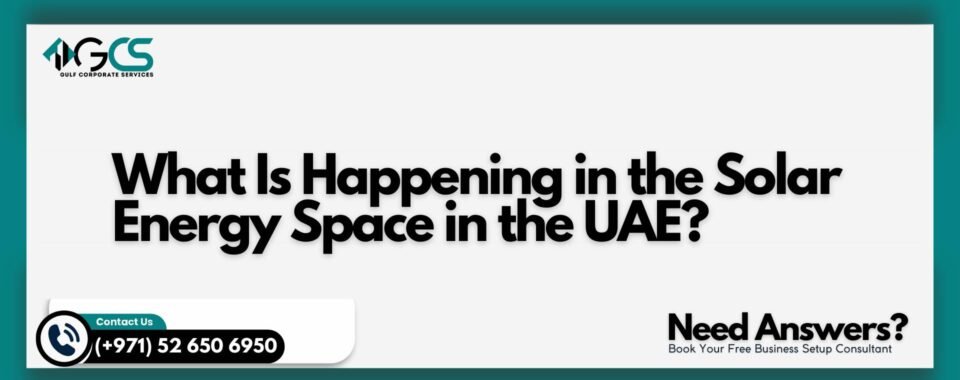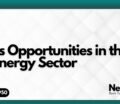
The UAE is undergoing a major transformation in how it produces and uses energy. At the center of this shift is solar energy. With vast desert land, consistent sunshine, and ambitious government targets, the country is quickly becoming a global leader in solar power development. The momentum is building with record-breaking solar projects, clean energy strategies, and new business opportunities. This article explores what is truly happening in the solar energy space in the UAE, and why it matters now more than ever.
The Rise of Solar Energy in the UAE
The push for solar energy in the UAE is not new, but in recent years, it has gained serious momentum. The government has positioned solar power as a key part of its broader clean energy goals, especially under the UAE Energy Strategy 2050.
Key Goals and Milestones
The UAE Energy Strategy 2050 aims to increase the share of clean energy in the national energy mix to 50% by 2050, with a large part of that being solar energy. This includes both photovoltaic (PV) and concentrated solar power (CSP) technologies.
Government Backing and Regulations
Government bodies like DEWA (Dubai Electricity and Water Authority) and ADWEA (Abu Dhabi Water and Electricity Authority) have introduced new solar-friendly policies, tenders, and subsidies to promote investment. These steps are helping drive adoption at both utility and residential levels.
Mega Solar Projects in the UAE
The UAE is home to some of the world’s largest solar projects, signaling its serious commitment to renewable energy.
Mohammed bin Rashid Al Maktoum Solar Park
This flagship solar project in Dubai is one of the largest single-site solar parks in the world. It aims to generate 5,000 megawatts (MW) by 2030. Built in multiple phases, it features both PV panels and CSP towers.
Al Dhafra Solar Project
Located in Abu Dhabi, the Al Dhafra solar plant is another massive installation with a capacity of over 2 GW. It has helped break global records for the lowest cost of solar energy production.
Shams 1 CSP Plant
Shams 1 is a large concentrated solar power project in the Western Region of Abu Dhabi. It is one of the first commercial CSP plants in the region and shows the diversity of solar technologies in use.
Decentralized Solar and Rooftop Installations
While mega-projects attract the headlines, the UAE is also seeing a boom in rooftop solar systems across homes, factories, and commercial buildings.
Shams Dubai Program
The Shams Dubai initiative by DEWA allows building owners to install solar panels on rooftops and connect to the grid. Excess energy can be exported back to the grid, lowering electricity bills and promoting clean energy.
Smart Meters and Solar Integration
New smart meters are being rolled out to support real-time monitoring and better integration of rooftop solar with the grid. This is creating a more resilient, distributed energy system.
Adoption by Commercial and Industrial Sectors
Manufacturers, warehouses, and malls are increasingly installing solar rooftops to cut energy costs and improve sustainability profiles. This also aligns with their ESG goals and international compliance.
Innovation in Solar Technology
The UAE is not just installing solar panels—it’s becoming a hub for solar innovation.
Advanced Photovoltaic Modules
Local and international firms are testing high-efficiency solar panels, including bifacial modules and thin-film solar. These technologies help improve power output even in hot and dusty desert conditions.
Energy Storage Integration
Solar systems in the UAE are increasingly paired with battery storage systems to ensure 24/7 power reliability. This is especially important in remote areas and for critical infrastructure.
Solar-Powered Desalination Plants
The UAE is leading research in using solar energy for water desalination, helping solve water scarcity issues in a sustainable way.
Private Sector Involvement and Investment
Private companies are playing a big role in expanding the UAE’s solar energy capacity.
PPP Models and Tenders
Large solar projects often operate on a Public-Private Partnership (PPP) basis, attracting foreign investment and local contractors. Competitive bidding has led to record-low tariffs for solar electricity.
Green Financing and Solar Funds
Banks in the UAE are now offering green loans and solar financing schemes to encourage adoption. Clean tech funds are also being created to support solar startups and SMEs.
Business Opportunities for SMEs
From solar panel installation to maintenance services, solar training to IoT-based solar monitoring, the sector is full of small and medium business potential.
Employment and Skills Development in Solar
The rise in solar projects is also creating new job roles and boosting green skills in the local workforce.
Technical Training Programs
Institutions and private academies now offer solar technician training, design certifications, and grid-integration courses.
Local Talent Development
Initiatives are underway to include Emirati nationals in solar project management, R&D, and operations, making it a pillar of the country’s green economy.
International Partnerships in Training
Collaboration with foreign training bodies and universities ensures that the UAE’s workforce stays updated with global solar standards and practices.
Environmental and Economic Impact of Solar Energy
The shift to solar power in the UAE brings multiple benefits.
Carbon Emissions Reduction
With every megawatt of solar added, the UAE is reducing its carbon footprint. This contributes to the global fight against climate change.
Energy Security and Diversification
By moving away from oil and gas, the UAE is making its energy supply more diverse and secure.
Economic Diversification and Innovation
Solar energy contributes to the country’s goal of becoming a knowledge-based economy, creating value through tech innovation, manufacturing, and R&D.
Policies Supporting Solar Growth in the UAE
The UAE government has introduced forward-thinking policies and incentives to encourage solar adoption across all sectors. These include net metering, customs benefits, and free zone perks, making it easier for individuals and businesses to transition to solar power while also contributing to national sustainability goals.
Net Metering Policies
Net metering allows consumers to export excess solar power to the grid, which is then subtracted from their energy bills. This makes solar more financially attractive.
Customs and Tax Benefits
Duty exemptions, VAT reductions, and free trade zone benefits are available for companies importing and installing solar equipment.
Standardized Solar Regulations
Uniform codes and procedures simplify solar system design, approval, and connection. This reduces red tape and increases market confidence.
Challenges in the UAE Solar Energy Sector
Despite rapid progress, the UAE’s solar sector still faces several practical and financial challenges. These include upfront costs, harsh desert conditions, and limited public awareness. Tackling these issues through innovation, education, and support mechanisms is key to sustaining the country’s clean energy momentum.
High Initial Investment
Although costs are falling, solar still requires substantial upfront capital, especially for commercial-scale installations.
Dust and Heat Impacts
Desert conditions affect solar panel efficiency. Solutions like self-cleaning panels and climate-adapted designs are helping to overcome this.
Awareness and Adoption Gaps
Many households and small businesses are still unaware of the long-term savings and benefits of solar energy.
Also Read: Mainland Company Formation in Dubai
The Future of Solar Energy in the UAE
The future looks bright for solar energy in the UAE. With ambitious national goals, stronger private sector participation, and increasing technology integration, solar is set to lead the UAE’s clean energy shift.
2025 to 2030 Outlook
New solar phases will come online, more rooftop installations will be added, and local manufacturing of panels may begin.
Smart Cities and Solar Power
Cities like Dubai and Abu Dhabi are integrating solar into their smart city frameworks, powering streetlights, public buildings, and transportation systems.
UAE’s Global Leadership in Solar
By maintaining low tariffs, record efficiency, and international partnerships, the UAE is becoming a role model for solar-powered transformation worldwide.
Conclusion
The UAE is not just installing solar panels—it is building a clean energy future. With support from government, industry, and the public, the country is setting the standard for how nations can use solar energy to build a sustainable, secure, and innovation-driven economy. Businesses, investors, and individuals all have a role to play in this growing movement.
FAQs
Why is the UAE focusing on solar energy?
Because of its abundant sunlight, energy diversification goals, and the desire to reduce carbon emissions.
Can homeowners in the UAE install solar panels?
Yes. Programs like Shams Dubai allow residential installations with grid connectivity.
Is solar energy cheaper in the UAE?
Yes. The UAE has some of the world’s lowest solar tariffs due to large-scale projects and competitive bidding.
What are the biggest solar projects in the UAE?
The Mohammed bin Rashid Solar Park and Al Dhafra Solar Project are the largest.
Are there business opportunities in solar energy in the UAE?
Yes. From installation services to manufacturing and consulting, the sector is open to entrepreneurs and investors.
What technologies are used in UAE solar projects?
Mainly photovoltaic (PV), concentrated solar power (CSP), and hybrid systems with storage.
How can someone invest in solar projects in the UAE?
You can partner with public-private projects, start a solar business, or invest through clean tech funds.
What challenges does solar energy face in the UAE?
Mainly high initial costs, weather impacts, and awareness gaps.
Is solar energy sustainable in desert climates?
Yes. Technologies are evolving to work efficiently in hot, dusty conditions.
What is the role of DEWA in solar energy?
DEWA manages solar initiatives in Dubai and supports grid connections, policy-making, and incentives.








